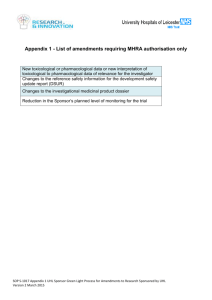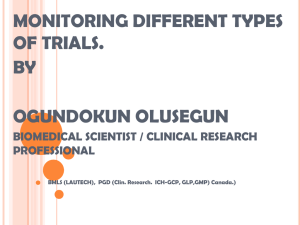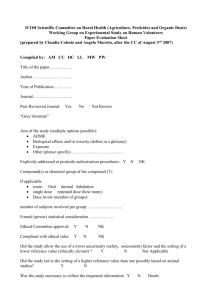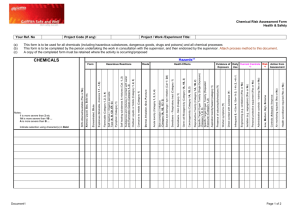APPLICATIONS FOR INVESTIGATIONAL NEW DRUGS
advertisement
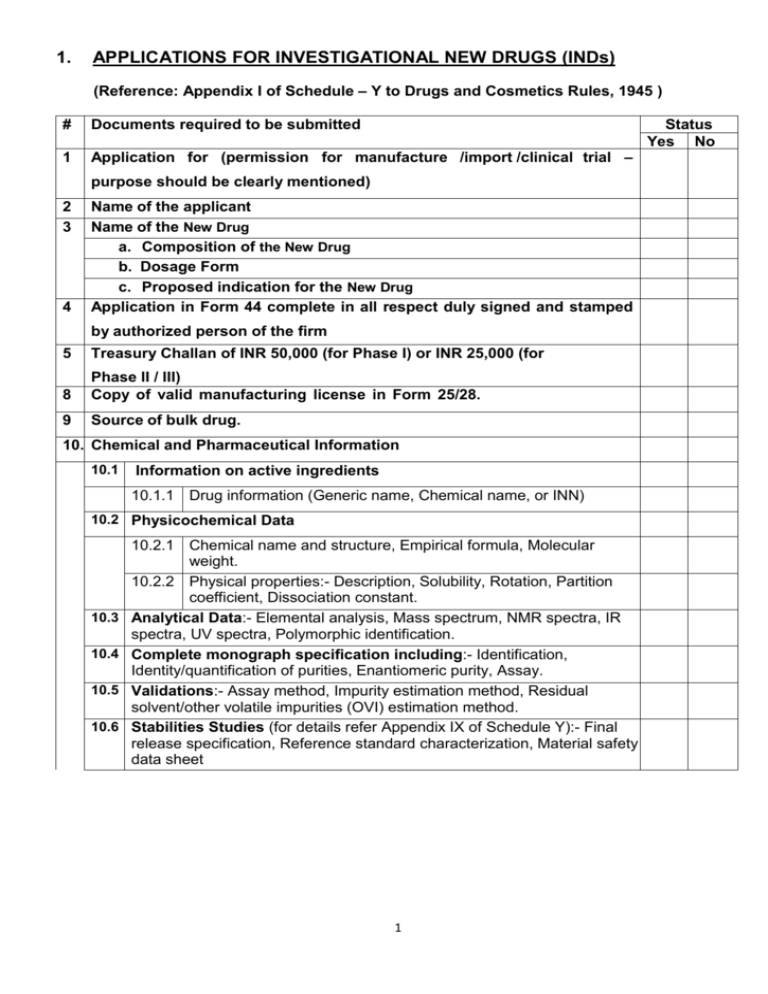
1. APPLICATIONS FOR INVESTIGATIONAL NEW DRUGS (INDs) (Reference: Appendix I of Schedule – Y to Drugs and Cosmetics Rules, 1945 ) # Documents required to be submitted Status Yes No 1 Application for (permission for manufacture /import /clinical trial – purpose should be clearly mentioned) 2 3 4 Name of the applicant Name of the New Drug a. Composition of the New Drug b. Dosage Form c. Proposed indication for the New Drug Application in Form 44 complete in all respect duly signed and stamped by authorized person of the firm 5 Treasury Challan of INR 50,000 (for Phase I) or INR 25,000 (for 8 Phase II / III) Copy of valid manufacturing license in Form 25/28. 9 Source of bulk drug. 10. Chemical and Pharmaceutical Information 10.1 Information on active ingredients 10.1.1 Drug information (Generic name, Chemical name, or INN) 10.2 Physicochemical Data 10.3 10.4 10.5 10.6 10.2.1 Chemical name and structure, Empirical formula, Molecular weight. 10.2.2 Physical properties:- Description, Solubility, Rotation, Partition coefficient, Dissociation constant. Analytical Data:- Elemental analysis, Mass spectrum, NMR spectra, IR spectra, UV spectra, Polymorphic identification. Complete monograph specification including:- Identification, Identity/quantification of purities, Enantiomeric purity, Assay. Validations:- Assay method, Impurity estimation method, Residual solvent/other volatile impurities (OVI) estimation method. Stabilities Studies (for details refer Appendix IX of Schedule Y):- Final release specification, Reference standard characterization, Material safety data sheet 1 10.7 Data on Formulation:- Dosage form, Composition, Master manufacturing formula, Details of the formulation (Including inactive ingredients), Inprocess quality control check, Finished product specification, Excipient compatibility study, Validation of analytical method. Comparative evaluation with international brand(s) or approved Indian brands, if applicable:- Pack presentation, Dissolution, Assay, Impurities, Content uniformity, pH, Force degradation study, Stability evaluation in market intended pack at proposed storage conditions, Packing specifications, Process validation. 11 Animal Pharmacology (as per Appendix IV of schedule Y ): 11.1 Summary 11.2 Specific pharmacological actions 11.3 General Pharmacological actions 11.4 F ollow-up and supplemental safety Pharmacology Studies 11.5 Pharmacokinetics: absorption, distribution, metabolism, excretion 12 Animal toxicology data (as per Appendix III of schedule Y): 12.1 General Aspects 12.2. Systemic Toxicity Studies, 12.3 Male Fertility Study 12.4 Female Reproduction and Developmental Toxicity Studies (for all drugs proposed to be studied or used in women of child bearing age) 12.5 Local toxicity (as applicable) 12.5.1 Dermal toxicity (for products meant for topical (dermal) application) 12.5.2 Ocular toxicity (for products meant for ocular instillation) 12.5.3. Inhalation toxicity (conducted with the formulation proposed to be used via inhalation route) 12.5.4 Vaginal toxicity (for products meant for topical application to vaginal mucosa) 12.5.5 Photoallergy or dermal phototoxicity (required if the drug or a metabolite is related to an agent causing photosensitivity or the nature of action suggests such a potential) 12.5.6 Rectal tolerance test (For all preparations meant for rectal administration) 12.6 Genotoxicity 12.7 Allergenicity/Hypersensitivity 2 12.8 Carcinogenicity (Carcinogenicity studies should be performed for all drugs that are expected to be clinically used for more than 6 months as well as for drugs used frequently in an intermittent manner in the treatment of chronic or recurrent conditions. However, completed rodent carcinogenicity studies are not needed in advance of the conduct of large scale clinical trials, unless there is a special concern for the patient population) Reports of following toxicity studies should be submitted along with clinical trial applications of different Phases for INDs: 3 For Phase I Clinical Trials Systemic Toxicity studies (i) Single dose toxicity studies (ii) Dose Ranging Studies (iii) Repeat-dose systemic toxicity studies of appropriate duration to support the duration of proposed human exposure. Male fertility study In-vitro genotoxicity tests Relevant local toxicity studies with proposed route of clinical application (duration depending on proposed length of clinical exposure) Allergenicity/Hypersensitivity tests (when there is a cause for concern or for parenteral drugs, including dermal application) Photo-allergy or dermal photo-toxicity test (if the drug or a metabolite is related to an agent causing photosensitivity or the nature of action suggests such a potential) For Phase II Clinical Trials Provide a summary of all the non-clinical safety data (listed above) already submitted while obtaining the permissions for Phase I trial, with appropriate references. In case of an application for directly starting a Phase II trial - complete details of the non-clinical safety data needed for obtaining the permission for Phase I trial, as per the list provided above must be submitted. Repeat-dose systemic toxicity studies of appropriate duration to support the duration of proposed human exposure In-vitro and In-vivo genotoxicity tests. Segment II reproductive/developmental toxicity study (if female patients of child bearing age are going to be involved) For Phase III Clinical Trials Provide a summary of all the non-clinical safety data (listed above) already submitted while obtaining the permissions for Phase I and II trials, with appropriate references. In case of an application for directly initiating a Phase III trial - complete details of the non-clinical safety data needed for obtaining the permissions for Phase I and II trials, as per the list provided above must be provided. Repeat-dose systemic toxicity studies of appropriate duration to support the duration of proposed human exposure Reproductive/developmental toxicity studies In-vitro and In-vivo genotoxicity tests. Segment I (if female patients of child bearing age are going to be involved), and Segment III (for drugs to be given to pregnant or nursing mothers or 4 where there are indications of possible adverse effects on foetal development). Carcinogenicity studies (when there is a cause for concern or when the drug is to be used for more than 6 months). 13 Human / Clinical pharmacology (Phase I) including summary of the study and reports 13.1 Summary 13.2 Specific Pharmacological effects 13.3 General Pharmacological effects 13.4 Pharmacokinetics, absorption, distribution, metabolism, excretion 13.5 Pharmacodynamics / early measurement of drug activity 14 Therapeutic exploratory trials (Phase II) 14.1 Summary 14.2 Study report(s) as given in Appendix II 15 Therapeutic confirmatory trials (Phase III) 15.1 Summary 15.2 Individual study reports with listing of sites and Investigators. 16 Special Studies 16.1 Summary 16.2 Bio-availability / Bio-equivalence 16.3 Other studies e.g. geriatrics, paediatrics, pregnant, or nursing women. 17 Regulatory status in other countries:17.1 Countries where the drug is 17.1.1 Marketed 17.1.2 Approved 17.1.3 Approved as IND 17.1.4 Withdrawn, if any, with reasons. 17.2 Restrictions on use, if any, in countries where marketed / approved. 17.3 Free sale certificate or certificate of analysis, as appropriate. 18 Prescribing Information:18.1 Proposed full prescribing information. 19 Samples and Testing Protocol/s 19.1 Samples of pure drug substance and finished product (an equivalent of 50 clinical doses, or more number of clinical doses if prescribed by the Licensing Authority), with testing protocols, full impurity profile and release specifications.) (To be submitted to the laboratory as directed by the Licensing Authority) 5 20. STRUCTURE, CONTENTS AND FORMAT FOR CLINICAL TRIAL PROTOCOL (Reference: Appendix- X of Schedule – Y to Drugs and Cosmetics Rules, 1945 ) # Documents required to be submitted Status Yes 1. Title Page 2. Table of Contents 3. Study Objective(s) (primary as well as secondary) and their logical relation to the study design. 4. Study Design 5. Study Population 6. Subject Eligibility - Inclusion Criteria and Exclusion Criteria 7. Study Assessments 8. Study Treatment 9. Adverse Events 10. Ethical Considerations 11. Study Monitoring and Supervision 12. Study Monitoring and Supervision 13. Investigational Product Management 14. Data Analysis 15. Undertaking by the Investigator as per Appendix VII of Schedule Y:(Ethics Committee should be of same area where the site is located and details of the committee should be mentioned). 6 No 16. Informed Consent Documents:- Patient Information Sheet (PIS) / Informed consent form (ICF) as per revised Appendix V of Schedule Y including the following clauses. A. Statement describing the financial compensation and medical management as under:a) In the event of an injury occurring to the clinical trial subjects, such subjects shall be provided free medical management as long as required. b) In the event of a trial related injury or death, the sponsor or his representative, whosoever has obtained permission from licensing authority for conduct of clinical study shall provide financial compensation for the injury or death. B. In serial no. 02 of an Appendix V, the following shall be included: Address of the subject: Qualification: Occupation: Student/Self=employed/service/Housewife/Other. (Please tick as appropriate) Annual income of Subject: Name and Address of nominee and his/her relation to the subject. ( for the purpose of compensation in case of trial related death ) C. After the name of witness occurring at the end, the following shall be inserted: “Copy of the patient information sheet and duly filled ICF shall be handed over to the subject or his/her attendant” 17. Undertaking by the Sponsor/Sponsors representative/applicant to the licensing authority to provide medical management and compensation in case of clinical trial related injury or death for which subjects are entitled to compensation as required under rule 122DAB(6). 18. Declaration regarding financial status of the applicant vis-à-vis medical management and compensation to be paid to the trial participants (in case of injury or death in clinical trial) 19. List of Investigators including site address (es). (a) Trial site details (whether it is equipped with super specialty or multispecialty facilities and emergency facilities with Institutional ethics committee. (b) Furnish details on the total number of trials being undertaken currently by the proposed Investigator. 20. 21. Ethics Committee approvals, if available:(Institutional Ethics Committee should be in same area where the site is located). As per the protocol, whether the subjects will receive the standard care. (Give declaration) 7 22. Details of the contract entered by the sponsor with the investigator/institutions with regard to financial support, amount of fees, honorarium, payments in kind etc. to be paid to the investigator. In case no contract has yet been entered with any Investigator / Institution, plan for financial support, fees, honorarium, and payments in kind etc. to be paid to the investigator. 21. STRUCTURE, CONTENTS AND FORMAT FOR CLINICAL STUDY REPORTS (Reference: Appendix- II of Schedule – Y to Drugs and Cosmetics Rules, 1945 ) # Documents required to be submitted Status Yes 1. Title Page 2. Study Synopsis 3. Statement of compliance with the ‘Guidelines for Clinical Trials on Pharmaceutical Products in India 4. List of Abbreviations and Definitions 5. Table of contents 6. Copy of Ethics Committee approval 7. Study Team 8. Introduction 9. Study Objective 10. Investigational Plan 11. Trial Subjects 12. Efficacy evaluation 13. Safety Evaluation 8 No 14. Discussion and overall Conclusion 15. List of References Note: 1. All items mentioned above may not be applicable to all drugs. The items not relevant to a particular new drug should be marked with “Not Applicable (NA)”. 2. In case the application is for clinical trial permission :(a) adequate chemical and pharmaceutical information should be provided to ensure the proper identity, purity, quality & strength of the investigational product, the amount of information needed may vary with the Phase of clinical trials, proposed duration of trials, dosage forms and the amount of information otherwise available (b) In case of applications for protocol amendments of already approved studies, applicants should submit copy of approval of protocol, amended new protocol, summarized list of all the new changes incorporated alongwith justification / reasons for the change. (c) Ethics Committee Approval: Ethical approval should be obtained from Ethics Committee located in the same area where the clinical trial site is located. (d) The proposed clinical trial study centers should be geographically distributed in the country and should also include clinical sites which have their own Institutional Ethics Committee. 9 2. CHECKLIST FOR ACCEPTABILITY OF APPLICATION PERTANING TO GRANT OF PERMISSION TO IMPORT OR MANUFACTURE NEW DRUGS GOING TO BE INTRODUCED FOR THE FIRST TIME IN THE COUNTRY FOR SALE OR TO UNDERTAKE CLINICAL TRIALS (Reference: Appendix I of Schedule – Y to Drugs and Cosmetics Rules, 1945 ) # Documents required to be submitted Status Yes No 1 Application for (permission for manufacture /import/clinical trial – purpose should be clearly mentioned) 2 3 4 Name of the applicant Name of the New Drug a. Composition of the New Drug b. Dosage Form c. Proposed indication for the New Drug Application in Form 44 complete in all respect duly signed and stamped by authorized person of the firm 5 Treasury Challan of INR 50,000 (for Phase I) or INR 25,000 (for 8 Phase II / III) Copy of valid manufacturing license in Form 25/28 along with copy of 9 form 29of bulk drug. Source 10. Chemical and Pharmaceutical Information 10.1 Information on active ingredients 10.1.1 Drug information (Generic name, Chemical name, or INN) 10.2 Physicochemical Data 10.3 10.4 10.5 10.6 10.2.1 Chemical name and structure, Empirical formula, Molecular weight. 10.2.2 Physical properties:- Description, Solubility, Rotation, Partition coefficient, Dissociation constant. Analytical Data:- Elemental analysis, Mass spectrum, NMR spectra, IR spectra, UV spectra, Polymorphic identification. Complete monograph specification including:- Identification, Identity/quantification of purities, Enantiomeric purity, Assay. Validations:- Assay method, Impurity estimation method, Residual solvent/other volatile impurities (OVI) estimation method. Stabilities Studies (for details refer Appendix IX of Schedule Y):- Final release specification, Reference standard characterization, Material safety data sheet 10 10.7 Data on Formulation:- Dosage form, Composition, Master manufacturing formula, Details of the formulation (Including inactive ingredients), Inprocess quality control check, Finished product specification, Excipient compatibility study, Validation of analytical method. Comparative evaluation with international brand(s) or approved Indian brands, if applicable:- Pack presentation, Dissolution, Assay, Impurities, Content uniformity, pH, Force degradation study, Stability evaluation in market intended pack at proposed storage conditions, Packing specifications, Process validation. 11 Animal Pharmacology (as per Appendix IV of schedule Y ): 11.1 Summary 11.2 Specific pharmacological actions 11.3 General Pharmacological actions 11.4 F ollow-up and supplemental safety Pharmacology Studies 11.5 Pharmacokinetics: absorption, distribution, metabolism, excretion 12 Animal toxicology data (as per Appendix III of schedule Y) 12.1 General Aspects 12.2. Systemic Toxicity Studies, 12.3 Male Fertility Study 12.4 Female Reproduction and Developmental Toxicity Studies (for all drugs proposed to be studied or used in women of child bearing age) 12.5 Local toxicity (as applicable) 12.5.1 Dermal toxicity (for products meant for topical (dermal) application) 12.5.2 Ocular toxicity (for products meant for ocular instillation) 12.5.3. Inhalation toxicity (conducted with the formulation proposed to be used via inhalation route) 12.5.4 Vaginal toxicity (for products meant for topical application to vaginal mucosa) 12.5.5 Photoallergy or dermal phototoxicity (required if the drug or a metabolite is related to an agent causing photosensitivity or the nature of action suggests such a potential) 12.5.6 Rectal tolerance test (For all preparations meant for rectal administration) 12.6 Genotoxicity 12.7 Allergenicity/Hypersensitivity 11 12.8 Carcinogenicity (Carcinogenicity studies should be performed for all drugs that are expected to be clinically used for more than 6 months as well as for drugs used frequently in an intermittent manner in the treatment of chronic or recurrent conditions. However, completed rodent carcinogenicity studies are not needed in advance of the conduct of large scale clinical trials, unless there is a special concern for the patient population) 13 Human / Clinical pharmacology (Phase I) including summary of the study and reports 13.1 Summary 13.2 Specific Pharmacological effects 13.3 General Pharmacological effects 13.4 Pharmacokinetics, absorption, distribution, metabolism, excretion 13.5 Pharmacodynamics / early measurement of drug activity 14 Therapeutic exploratory trials (Phase II) 14.1 Summary 14.2 Study report(s) as given in Appendix II 15 Therapeutic confirmatory trials (Phase III) 15.1 Summary 15.2 Individual study reports with listing of sites and Investigators. 16 Special Studies 16.1 Summary 16.2 Bio-availability / Bio-equivalence 16.3 Other studies e.g. geriatrics, paediatrics, pregnant, or nursing women. 17 Regulatory status in other countries:17.1 Countries where the drug is. 17.1.1 Marketed 17.1.2 Approved 17.1.3 Approved as IND 17.1.4 Withdrawn, if any, with reasons. 17.2 Restrictions on use, if any, in countries where marketed / approved. 17.3 Free sale certificate or certificate of analysis, as appropriate. 18 Prescribing Information:18.1 Proposed full prescribing information. : The prescribing information (package insert) shall comprise the following sections: generic name; composition; Ddosage form/s, indications;dose and method of administration; use in special populations (such as pregnant women, lactating women, paediatric patients, geriatric patients etc.); contra- indications; warnings; precautions; drug interactions; undesirable effects; overdose; pharmacodynamic and pharmacokinetic properties; incompatibilities; shelf-life; packaging information; storage and handling instructions. 12 19 Samples and Testing Protocol/s 19.1 Samples of pure drug substance and finished product (an equivalent of 50 clinical doses, or more number of clinical doses if prescribed by the Licensing Authority), with testing protocols, full impurity profile and release specifications.) (To be submitted to the laboratory as directed by the Licensing Authority) 20 Proposed Draft specimen of the label and carton. The drafts of label and carton texts should comply with provisions of Rules 96 and 97. 21 If the study drug is intended to be imported for the purposes of examination, test or analysis, the application for import of small quantities of drugs for such purpose should also be made in Form 12. 13 22. STRUCTURE, CONTENTS AND FORMAT FOR CLINICAL TRIAL PROTOCOL (Reference: Appendix - X of Schedule – Y to Drugs and Cosmetics Rules, 1945 ) # Documents required to be submitted Status Yes 1. Title Page 2. Table of Contents 3. Study Objective(s) (primary as well as secondary) and their logical relation to the study design. 4. Study Design 5. Study Population 6. Subject Eligibility - Inclusion Criteria and Exclusion Criteria 7. Study Assessments 8. Study Treatment 9. Adverse Events 10. Ethical Considerations 11. Study Monitoring and Supervision 12. Study Monitoring and Supervision 13. Investigational Product Management 14. Data Analysis 15. Undertaking by the Investigator as per Appendix VII of Schedule Y:(Ethics Committee should be of same area where the site is located and details of the committee should be mentioned). 14 No 16. Informed Consent Documents:- Patient Information Sheet (PIS) / Informed consent form (ICF) as per revised Appendix V of Schedule Y including the following clauses. D. Statement describing the financial compensation and medical management as under:c) In the event of an injury occurring to the clinical trial subjects, such subjects shall be provided free medical management as long as required. d) In the event of a trial related injury or death, the sponsor or his representative, whosoever has obtained permission from licensing authority for conduct of clinical study shall provide financial compensation for the injury or death. E. In serial no. 02 of an Appendix V, the following shall be included: Address of the subject: Qualification: Occupation: Student/Self=employed/service/Housewife/Other. (Please tick as appropriate) Annual income of Subject: Name and Address of nominee and his/her relation to the subject. ( for the purpose of compensation in case of trial related death ) F. After the name of witness occurring at the end, the following shall be inserted: “Copy of the patient information sheet and duly filled ICF shall be handed over to the subject or his/her attendant” 17. Undertaking by the Sponsor/Sponsors representative/applicant to the licensing authority to provide medical management and compensation in case of clinical trial related injury or death for which subjects are entitled to compensation as required under rule 122DAB(6). 18. Declaration regarding financial status of the applicant vis-à-vis medical management and compensation to be paid to the trial participants (in case of injury or death in clinical trial) 19. List of Investigators including site address (es). (c) Trial site details (whether it is equipped with super specialty or multispecialty facilities and emergency facilities with Institutional ethics committee. (d) Furnish details on the total number of trials being undertaken currently by the proposed Investigator. 20. 21. Ethics Committee approvals, if available:(Institutional Ethics Committee should be in same area where the site is located). As per the protocol, whether the subjects will receive the standard care. (Give declaration) 15 22. Details of the contract entered by the sponsor with the investigator/institutions with regard to financial support, amount of fees, honorarium, payments in kind etc. to be paid to the investigator. In case no contract has yet been entered with any Investigator / Institution, plan for financial support, fees, honorarium, and payments in kind etc. to be paid to the investigator. 23. Protocol of Bioequivalence study along with Informed Consent document and undertaking by Investigator in case of Oral Dosage Forms having systematic absorption. In case of biowaiver, justification should be submitted. 24. STRUCTURE, CONTENTS AND FORMAT FOR CLINICAL STUDY REPORTS: (Reference: Appendix II of Schedule – Y to Drugs and Cosmetics Rules, 1945 ) # Documents required to be submitted 1. Title Page 2. Study Synopsis 3. Statement of compliance with the ‘Guidelines for Clinical Trials on Pharmaceutical Products in India 4. List of Abbreviations and Definitions 5. Table of contents 6. Copy of Ethics Committee approval 7. Study Team 8. Introduction 9. Study Objective 10. Investigational Plan 11. Trial Subjects 16 Status Yes No 12. Efficacy evaluation 13. Safety Evaluation 14. Discussion and overall Conclusion 15. List of References Note: 1. All items mentioned above may not be applicable to all drugs. The items not relevant to a particular new drug should be marked with “Not Applicable (NA)”. 2. Application for both bulk as well as formulation is required to be submitted. Proposal for grant of permission to manufacture only bulk drug will be considered after approval of it’s formulation. 3. In case the application is for clinical trial permission: a. Adequate chemical and pharmaceutical information should be provided to ensure the proper identity, purity, quality & strength of the investigational product, the amount of information needed may vary with the Phase of clinical trials, proposed duration of trials, dosage forms and the amount of information otherwise available. b. In case of applications for protocol amendments of already approved studies, applicants should submit copy of approval of protocol, amended new protocol, summarized list of all the new changes incorporated along with justification / reasons for the change. c. Ethics Committee Approval: Ethical approval should be obtained from Ethics Committee located in the same area where the clinical trial site is located. d. The proposed clinical trial study centres should be geographically distributed in the country and should also include clinical sites which have their own Institutional Ethics Committee. ------------------------ 17

